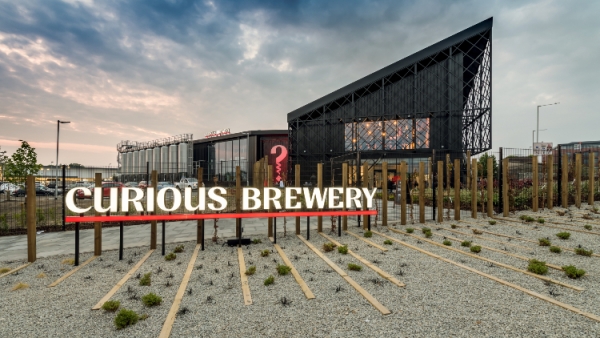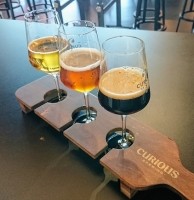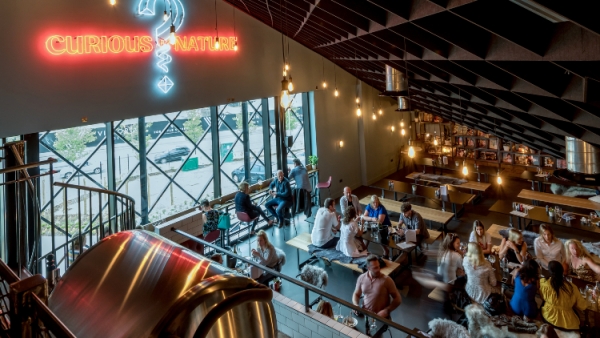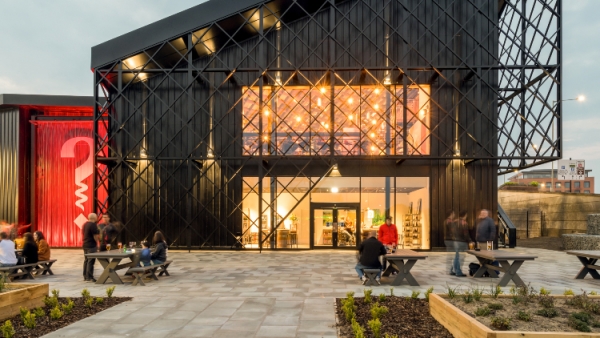Big interview
Curious Brewery is as disruptive as anyone

Joining the drinks partner of the London Symphony Orchestra from irreverent punk crusaders BrewDog may seem as jarring a move as is possible within brewing, however, Gareth Bath insists the two have more in common than you might think.
“The businesses are both brilliant and at the forefront of British drinks for slightly different ways,” he explains. “They’re really leading in an area where consumer habits have moved towards premiumisation, product quality and authenticity and really pulling those elements into what goes into the drink – BrewDog are brilliant at it from a beer perspective.
“Chapel Down has a different brand positioning, a bit more sophisticated, a bit more premium and being a quintessentially British luxury brand at its heart, but it’s as disruptive as anyone. Taking on the French for sparkling wine and beating them in global awards is no mean feat and I think that comes from like-minded thinking and hopefully that’s one of the things I added – an ability to look at drinks and understand drinkers.”
Unbelievable statement
It’s an approach that appears to be paying off for Kent-based brewer, wine and spirit maker Chapel Down as the company’s combined sales rose from £11.8m in 2017 to just over £13m during 2018. Established in 2011, beer arm Curious Brewery contributed £4m of this – a 10% increase year on year – and deliver a gross profit of £1.29m in isolation.
Hiring Bath from BrewDog in October 2017, followed by Matthew Anderson’s appointment from brewing behemoth AB InBev (now Budweiser Brewing Group) a year later, and investing in a new multimillion-pound site in Ashford, Kent, capable of quadrupling the company’s brewing output, underlines how seriously Chapel Down is taking its brewing business.
In designing the restaurant and bar at Curious Brewery’s dramatic new facility, for example, Bath explains that Curious took inspiration from BrewDog’s approach to hospitality – ensuring its brewpubs can offer drastically different experiences depending on where you’re sitting.
Customers may want to stop in for a pint, pinot noir G&T or even popcorn cockles – whatever they choose, the surroundings may involve sitting on a mezzanine level on faux-fur draped canteen tables or, if views are important, a berth next to a soundproof window could be inviting if a closer inspection of the working brewery is required.
Topped off with subtle neon signage, a well-stocked record collection and an artistic echo absorbing lattice hanging from the metal ceiling – which the London Symphony Orchestra is to test at a later date – the meticulous approach is evident.
“It’s going to be a jewel in the crown for Chapel Down,” Bath says of the new facility. “We’ve invested a lot in the wine side of the business, we’ve had the biggest harvest in our history, we’ve planted the biggest vineyard the country will see, we’ve opened the gin works at King’s Cross, but this is by some way the biggest investment to date.
“I refer to this place as a cathedral of beer, mostly because of the way it looks – it’s really dramatic. If you’re putting something in a town centre, as opposed to on the edge of an industrial estate, you want it to look beautiful and you want people to come and really enjoy spending time there. Every effort has gone into making the place look premium. Bang in Ashford town centre, you’ve got this unbelievable statement of modern brewing.”
Curious Brewery in numbers
38 minutes – the time it takes to reach Ashford International from St Pancras International on HS1
20,000sq ft – the size of the Curious Brewery, including 1,000sq ft of retail as well as 4,000sq ft of restaurant and bar space
170,000 – the number of pints of beer the brewery can hold at any one time – enough to give two to everyone in Ashford
> £1,000,000 – cost of building the new Curious Brewery
19 – number of fermentation tanks at the new site
4,000 – number of bespoke Curious bottles per hour the facility will be able to produce when fully functioning
Three-stop tourism
A market town on the fringes of the North Downs in Kent – the oast house-strewn heartland of 321-year-old brewer Shepherd Neame – doesn’t spring to mind as the most natural home for a glass and stainless steel statement of modern beer-making.
However, easily accessible Ashford International train station on HS1 – a high speed artery bisecting the beer garden of England from London to the Channel Tunnel – the site sits at a perfect meeting point between Chapel Down’s winery, recently expanded to produce an extra 1m bottles of wine per year, and its gin works at King’s Cross.
“We’re excited about the three-stop tourism we’ll be able to offer,” Bath explains. “If you start at King’s Cross, at the gin works, you can jump on the train out to the brewery and then it’s 25 minutes by road to the winery site. In whichever order you please, you’ll be able to do all three stops in a day, which we think is really exciting and unique.”
Chapel Down’s background as a winemaker in a county historically leaning more towards grain than grape yields unique opportunities. Not only does it facilitate a unique approach to brewing – Curious Lager is fermented with Champagne yeast, for example – but fosters strong working relationships with local producers.
“Being a winemaker at heart, we talk about our drinks being almost like a conversation with the earth,” Bath explains. “We’re a farmer, we grow the grapes, we bring that from field right through to glass. That’s the principal that we’re trying to bring through being Kent based – increasingly so on the brewing side of the business.
“We’ve got vineyards that neighbour some of the best hop fields in the UK by a distance. We’re able to now really start working one-to-one with some of the hop growers from a sourcing point of view.”
Agricultural heritage, modern brand
As much as heritage and local roots are ingrained in Chapel Down and Curious, the brewery has combined this with many prevalent features of modern craft beer brands.
This is immediately evident at the new site where the company’s logo – the question mark corkscrew – is emblazoned on the brewery’s façade behind a water feature Bath describes as the accidently Instagram friendly “Frazer Falls” – named for Chapel Down chief executive officer Frazer Thomson.
Moreover, like many modern craft brewers, Curious is willing to work in tandem to branch out. Not only will the fully functioning brewery include a smaller brewhouse to produce small-batch beers and guest brews, but work with partners to deliver unique consumer experiences.
“We’re looking at a lot of activation from a brand point of view around London and the south-east,” Bath explains. “So London Craft Beer festival, Regents Park open theatre, the Mr Porter Nocturne event. Partnerships with the likes of the London Symphony Orchestra and the Donmar Theatre will all really feature for Curious.
“Our headline partnership with the Curious arts festival – which has moved location from Hampshire across to East Sussex – is so much closer to our heartland.”
Moreover, with brewers increasingly venturing into premises of their own, will Curious Brewery eventually look to open satellite brewpubs and taprooms of its own?
“Never say never but it’s not a core focus,” Bath says. “We’re already a 60% on-premises business and the focus for this year is firmly on the local south-east and London distribution within the on-premises and national on premises. We’re brand building within that and working within our existing and new customers to grow rate of sale.
“Curious Brew especially, an English premium lager, has all the credibility of craft from a brewing point of view all the brand presence of premium and super-premium lagers, we think that’s a unique and exciting space for on premise retail to really start to add some value back into the lager side of the category in the same way that IPAs have done especially for craft beer.”
Future focus
Looking ahead to the next 12 months, Bath outlines “really simple” areas of focus to continue Curious’s growth.
“We’ve got to get the site open and get the quality of the beer coming off that better than it’s ever been. If we do that, that’s a great success for 2019. We want to fill that site with people. Tourism is a big part of what we do and having strong footfall through that site in the same way that we do at the winery.
“We have 70,000 people a year visit the winery at Tenterden, which is a little place an hour and a half outside London. If we can, in any way, mirror the success from a tourism point of view at Tenterden at the brewery in Ashford that would be a great success.
“Then the other element is our core beers and their position with our on-premises customers. For Curious and for Chapel Down, being part of that ongoing trend of people looking for great premium local products, if we can play a small part in that then that would be a real success for us.”
What’s more, ties to local producers in the garden of England can help Chapel Down reduce its environmental impact according to Bath. Reducing the carbon footprint at Curious, which supplies spent grain, a bi-product from its brewing process, to local Kentish cattle farmers – from whom the brewer sources beef for its bar and restaurant, is “a growing focus”.
“That’s part of bringing production in-house, we really start to reduce the air miles of the entire journey from field through to glass and being able to work with much more local partners on that point of view,” Bath adds.
“It’s early days, but by taking control of that, things like pints of water ratio per pint of beer we start to take ownership and control of, which we’ve not had before. That enables us to get economy of scale from across the wine, the beer, the spirits side of things and reducing our footprint as we go.
“For the whole industry there’s a huge amount of work to do on this front. It’s definitely one for us in terms of focus going forwards.”















